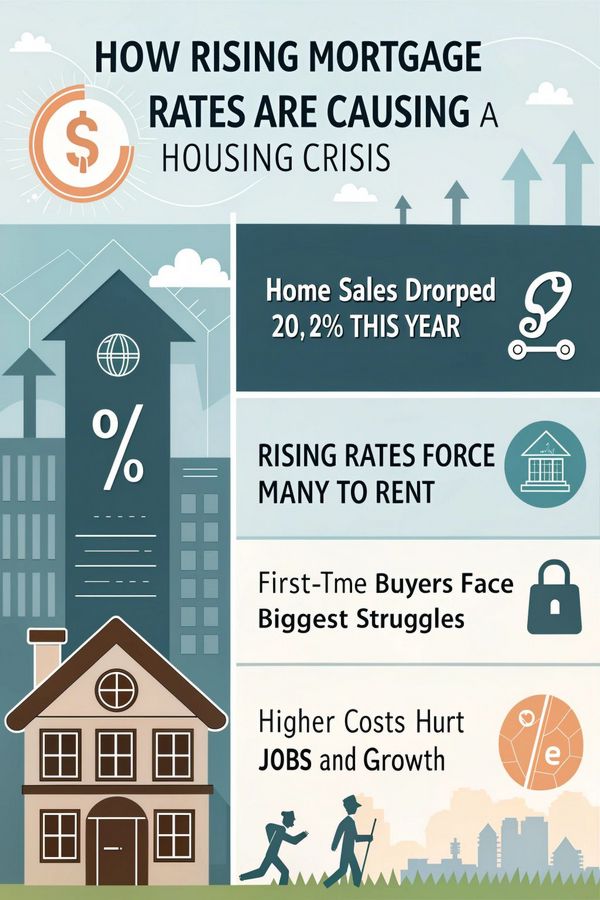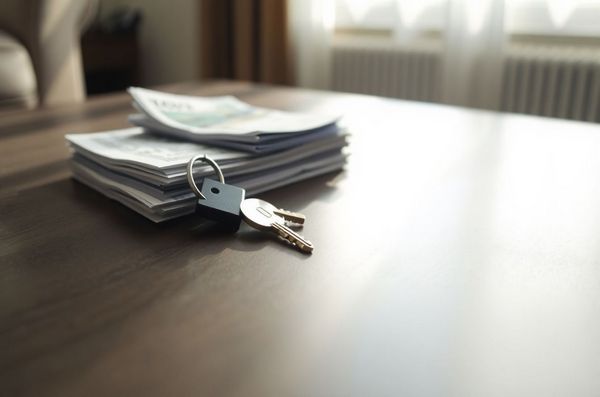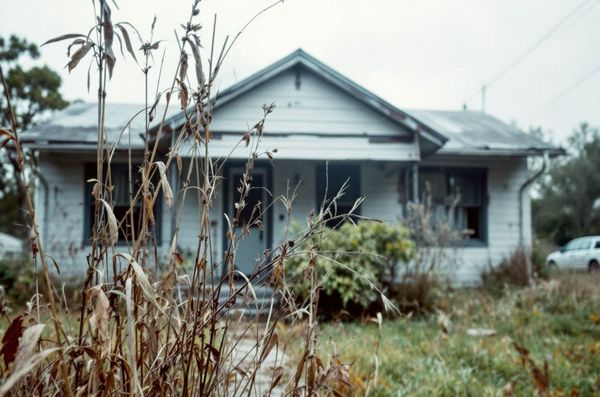Buying a home has become harder for many people. Mortgage rates are rising fast, and homes are already expensive. This leaves families feeling stuck, struggling to afford what used to feel possible.
Did you know that home sales dropped by over 20% in just one year? Higher borrowing costs mean fewer people can buy homes. In this article, we’ll explain why this is happening and how it reshapes the housing market.
Keep reading—you won’t want to miss this!
The Impact of Rising Mortgage Rates on Home Affordability
Rising mortgage rates are making it harder for people to afford homes. Borrowers face higher costs, creating major money challenges.
Increased monthly payments for new borrowers
New borrowers face higher monthly payments due to increasing mortgage rates. A rise in rates makes borrowing more expensive, adding hundreds of dollars to monthly bills. With home prices still high, affordability shrinks further.
For example, a 20% year-over-year drop in home sales from August highlights the effects on demand.
Higher borrowing costs also mean fewer buyers can qualify for loans. Many need larger incomes or savings to cover these steep payments. This creates an affordability crisis that pushes potential buyers out of the market and into renting instead.
Tighter lending standards
Lenders have become stricter with loans due to rising mortgage rates. Borrowers now face harder rules, like higher credit score demands and bigger down payments. These changes make it tough for many to qualify for a home loan.
High inflation and increasing borrowing costs hurt affordability further. Home sales dropped by 20.2% year-over-year from August as fewer people could meet these standards. First-time buyers feel the most pressure, often needing more time to save up while housing prices remain steep.
Effects on Home Sales and Market Dynamics
Higher mortgage rates are making homes harder to sell. Fewer people want to buy, changing how the market works.
Decline in home sales volume
Home sales have dropped by 20.2% from August last year. Rising mortgage rates make monthly payments too expensive for many buyers. This has lowered demand and pushed people away from the housing market.
High borrowing costs discourage buying, even as price growth slows. Many potential buyers rent instead of purchasing homes. Combined with high home prices, this keeps the market struggling to recover.
Shift towards renting rather than buying
Rising mortgage rates make owning a home too costly for many. Borrowing costs are high, and monthly payments stretch budgets thin. This pushes more people to rent instead of buy.
Home sales dropped 20.2% year-over-year in August due to higher borrowing costs. Renters avoid the large down payments needed to buy homes now. Many delay purchasing until rates drop or prices stabilize.
Increased Financial Burden on First-time Homebuyers

Buying a first home is getting harder. Rising costs mean saving takes longer, and many feel stuck renting instead.
Higher down payments required
Homebuyers now need to save more money upfront. High mortgage rates and rising home prices make it worse for first-time buyers. Some lenders ask for 20% or more as a down payment, which puts many homes out of reach.
Saving for this higher amount takes longer. Families delay buying their first home because costs grow faster than incomes. This adds stress to an already tough housing market.
Longer saving periods for potential buyers
High mortgage rates and rising home prices make saving harder. Buyers need larger down payments, especially with tight budgets. Higher borrowing costs mean it takes more time to afford a home.
A year-over-year drop in home sales by 20.2% from August shows the strain on buyers. Many potential buyers keep saving but feel stuck as prices stay high. This delay impacts when they can enter the housing market.
Long-term Economic Impacts
Higher mortgage rates slow down home buying, which hurts the economy. People spend less on other things because housing costs take up more of their money.
Slowed economic growth due to reduced home buying
Rising borrowing costs make homes less affordable. Fewer people can buy homes, so demand drops. Home sales fell by 20.2% year-over-year in August. This slows construction and affects jobs tied to real estate, like builders or contractors.
High mortgage rates hurt consumer spending too. People spend more on payments and less on other things, weakening the economy. Lower home-buying activity also slows house price growth, creating more uncertainty for the market.
Decrease in consumer spending due to higher housing costs
Higher housing costs leave less money for other expenses. Elevated mortgage rates and rising home prices force buyers to spend more on homes. With borrowing costs increasing, people cut back on shopping, dining, and travel.
Home sales dropped 20.2% year-over-year by August due to these pressures.
Families saving longer for down payments also delay spending elsewhere. Inflation hits budgets hard while monthly payments grow larger. This slows the economy as fewer dollars go into businesses or services outside of housing markets.
Policy Responses to Mitigate the Crisis

Leaders are trying to lower mortgage costs and help buyers. They aim to make homes affordable again with new policies.
Government interventions in interest rates
The Federal Reserve adjusts interest rates to control inflation and borrowing costs. Higher mortgage rates, driven by these changes, make homeownership less affordable. In August, home sales dropped 20.2% compared to last year due to rising borrowing expenses.
Lowering rates can spark more buying activity. It encourages builders to start new projects and helps buyers afford homes again. Still, reduced rates don’t guarantee lower house prices or easier access for first-time buyers struggling with affordability.
Incentives for first-time buyers
Government programs often aim to help first-time buyers. Lower mortgage rates can motivate them to enter the market, giving a financial boost. Reduced interest could also encourage builders to construct more homes.
High prices and borrowing costs make this crucial for affordability.
Some policies focus on easing down payment needs or offering tax breaks. These actions can shorten saving time, making homeownership possible sooner. With housing sales dropping 20% from August last year, such measures are vital for market recovery.
Conclusion
Rising mortgage rates are shaking up the housing market. Buyers are struggling to afford homes, and sales have dropped sharply. Many people now rent instead of buy, putting more pressure on rental prices.
First-time buyers feel the squeeze the most with higher costs and longer waits to save enough money. Without action, housing will stay out of reach for many.
Frequently Asked Questions (FAQs)
1. Why are rising mortgage rates causing a housing crisis?
Higher mortgage rates make monthly payments more expensive, so fewer people can afford to buy homes. This reduces demand and slows the market.
2. How do high mortgage rates affect homebuyers?
They increase borrowing costs, meaning buyers either need bigger budgets or have to settle for cheaper homes (if they can find any!).
3. What happens to homeowners when mortgage rates go up?
Many stay put because selling means they’d need a new loan at higher rates—so fewer houses go on the market.
4. Are renters impacted by rising mortgage rates too?
Yes! As buying becomes harder, more people rent instead, which drives up rental prices due to increased demand.

